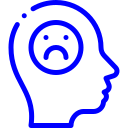The purpose of treatment for depression is to overcome your symptoms where they are not as severe or debilitating or no longer occur. Together with your mental health provider, you will define long and short-term objectives for treatment. Returning to a condition where you feel upbeat, self-assured, and capable of a regular level of functioning is a typical goal for many patients.
Depression is treated using a variety of strategies, including the use of antidepressant drugs, talk therapies and changes to unhealthy habits. The patient is continually monitored to assess the effectiveness of treatment. The mental health professional will use the results to determine the ongoing treatment that may include adjustments to ensure you are getting the optimal type of therapy.








